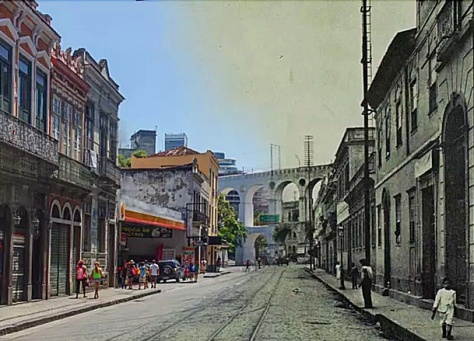At 450, Rio de Janeiro Does
Not Look a Day Older Than Me
 According to family records, Maria and Heitor were watching the Carnival parade on a Rio de Janeiro street, an early Ash Wednesday, when she went into labor. A rush to the military hospital was all it took for her third and last son to be born, a couple of hours later.
According to family records, Maria and Heitor were watching the Carnival parade on a Rio de Janeiro street, an early Ash Wednesday, when she went into labor. A rush to the military hospital was all it took for her third and last son to be born, a couple of hours later.
That’s probably why I never really liked Carnival. As for Rio, whose 450th anniversary is Sunday March 1, is not just Brazil’s premier party town – even when Cariocas decide to have fun with you – but where physical beauty and pleasure are steeped into its DNA.
The Saturnian nature of that night, and the subconscious background of music, rhythm and drums, was all I took from the city by the sea when we left it five years down the road. Oh, yes, I took something else too: in 1960, it ceased to be Brazil’s capital, a title transferred to Brasília.
Still one never really leaves Rio. I went back a few times – as if some insatiable thirst could only be quenched at that source -, lived there again for a few years, but since then, the city and I went our separated ways. One side misses the other more but there’s no bitterness.
My place of birth is no longer, anyway. From its then 2.5 million, it’s metastasized into a megalopolis of over 6 million people, pollution, urban violence, extreme income disparity, guns, drugs, corruption, you know, the full range of ills most South American cities know so well.

NATIVE FOREIGNER AT THE FAVELA REALM
But there are mysteries worth probing, hiding in its plain, 100 degrees average heat. The name, for instance: River of January? That’s got to be an inside joke: it’s not a river, but miles of seashore just a walking distance from downtown businesses. How do they mix? Don’t ask.
Also, it was officially founded on the third month of the year, not the first. Again, someone must have had a laugh about that. And for all the good vibes it inspires on people all over the world, reality on the ground in Rio is often more brutal than in New York. Now, go figure.
On a day in February I’ve left the 50s for the second time in my life, just like I’d done with Rio. As a dragged my own private Rio around the globe, mostly being a heavy-accented foreigner wherever I went, when I settled in the only city I’ve consciously chosen, New York, I finally knew where I’d come from.

TWO FEET IN THE 50S, TWICE LIVING IN THE CITY
Guanabara Bay will always inform everything feel about this life, even if now we speak different languages, and natives admire my perfect pronunciation of Portuguese, better than many a legal alien. But this transitional state is the ground I’ve made of by now, and will probably be laid to rest onto it too, someday.
I was born to the syncopated sway of Bossa Nova, Continue reading




